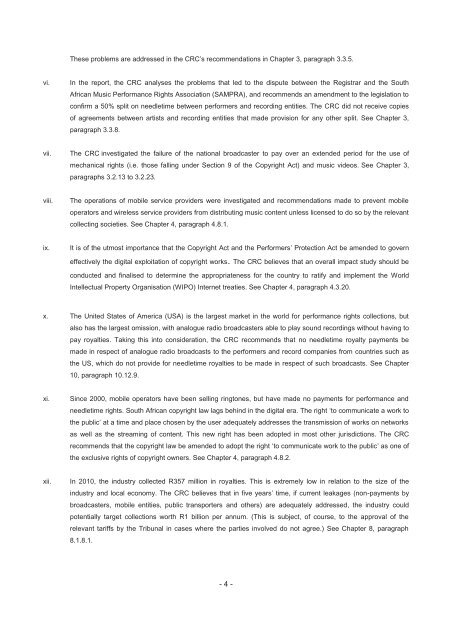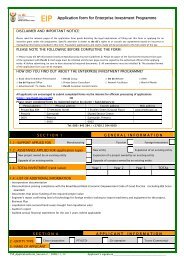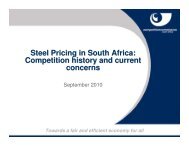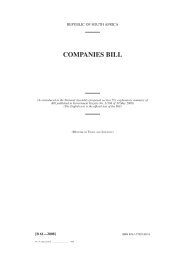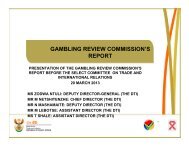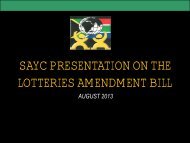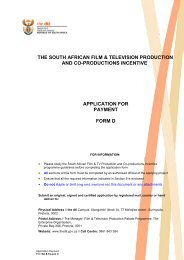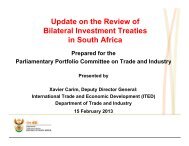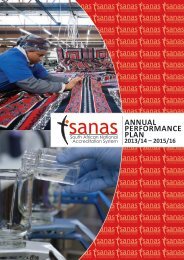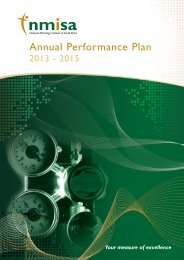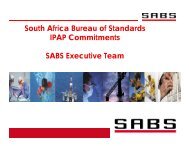Copyright Review Commission Report - ICT Law and Regulation ...
Copyright Review Commission Report - ICT Law and Regulation ...
Copyright Review Commission Report - ICT Law and Regulation ...
- No tags were found...
You also want an ePaper? Increase the reach of your titles
YUMPU automatically turns print PDFs into web optimized ePapers that Google loves.
These problems are addressed in the CRC’s recommendations in Chapter 3, paragraph 3.3.5.vi.In the report, the CRC analyses the problems that led to the dispute between the Registrar <strong>and</strong> the SouthAfrican Music Performance Rights Association (SAMPRA), <strong>and</strong> recommends an amendment to the legislation toconfirm a 50% split on needletime between performers <strong>and</strong> recording entities. The CRC did not receive copiesof agreements between artists <strong>and</strong> recording entities that made provision for any other split. See Chapter 3,paragraph 3.3.8.vii.The CRC investigated the failure of the national broadcaster to pay over an extended period for the use ofmechanical rights (i.e. those falling under Section 9 of the <strong>Copyright</strong> Act) <strong>and</strong> music videos. See Chapter 3,paragraphs 3.2.13 to 3.2.23.viii.The operations of mobile service providers were investigated <strong>and</strong> recommendations made to prevent mobileoperators <strong>and</strong> wireless service providers from distributing music content unless licensed to do so by the relevantcollecting societies. See Chapter 4, paragraph 4.8.1.ix.It is of the utmost importance that the <strong>Copyright</strong> Act <strong>and</strong> the Performers’ Protection Act be amended to governeffectively the digital exploitation of copyright works. The CRC believes that an overall impact study should beconducted <strong>and</strong> finalised to determine the appropriateness for the country to ratify <strong>and</strong> implement the WorldIntellectual Property Organisation (WIPO) Internet treaties. See Chapter 4, paragraph 4.3.20.x. The United States of America (USA) is the largest market in the world for performance rights collections, butalso has the largest omission, with analogue radio broadcasters able to play sound recordings without having topay royalties. Taking this into consideration, the CRC recommends that no needletime royalty payments bemade in respect of analogue radio broadcasts to the performers <strong>and</strong> record companies from countries such asthe US, which do not provide for needletime royalties to be made in respect of such broadcasts. See Chapter10, paragraph 10.12.9.xi.Since 2000, mobile operators have been selling ringtones, but have made no payments for performance <strong>and</strong>needletime rights. South African copyright law lags behind in the digital era. The right ‘to communicate a work tothe public’ at a time <strong>and</strong> place chosen by the user adequately addresses the transmission of works on networksas well as the streaming of content. This new right has been adopted in most other jurisdictions. The CRCrecommends that the copyright law be amended to adopt the right ‘to communicate work to the public’ as one ofthe exclusive rights of copyright owners. See Chapter 4, paragraph 4.8.2.xii.In 2010, the industry collected R357 million in royalties. This is extremely low in relation to the size of theindustry <strong>and</strong> local economy. The CRC believes that in five years’ time, if current leakages (non-payments bybroadcasters, mobile entities, public transporters <strong>and</strong> others) are adequately addressed, the industry couldpotentially target collections worth R1 billion per annum. (This is subject, of course, to the approval of therelevant tariffs by the Tribunal in cases where the parties involved do not agree.) See Chapter 8, paragraph8.1.8.1.- 4 -


